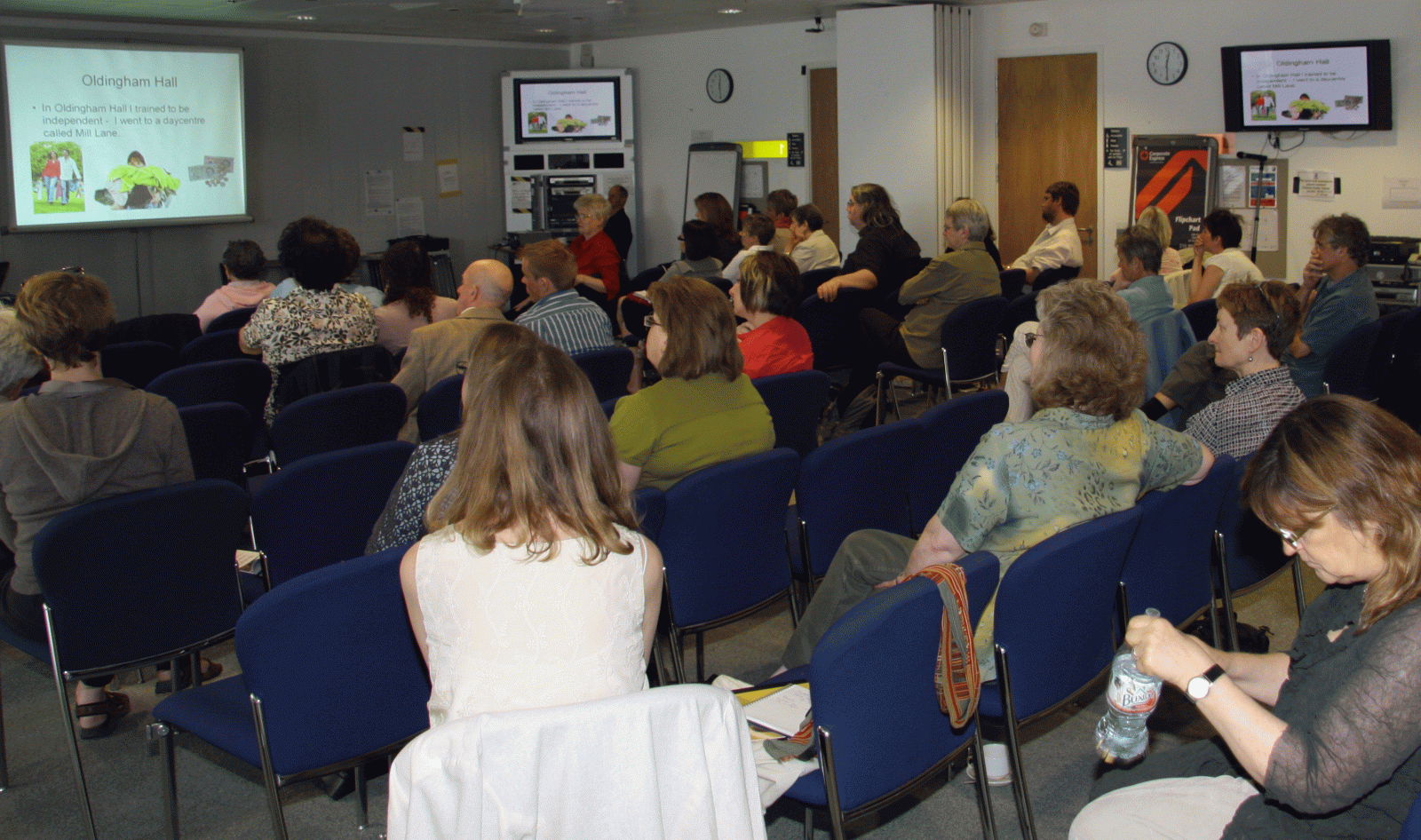You are here
- Home
- Conferences
- Conference 2009
Conference 2009
Families, history and learning difficulties

Held on 9th and 10th July 2009 at The Open University, Milton Keynes
Day one - 9th July 2009 - 'Discovering families'
Morning session
Introduction
Sue Dumbleton, Victor Hall and Pam Dale (co-chairs)
(Please note: there is no audio available for the Day 1 morning introduction.)
Keynote speech - Family secrets: learning difficulties and the family 1860-1960
Deborah Cohen
The children of the Victorians viewed their parents as the most formidable secret-keepers. Literature and legend support that view, filling Victorian attics with inconvenient relatives of every stripe.
Read the full abstract
Generation to generation: finding out about where people with learning difficulties fit into their family trees
Mabel Cooper and Gloria Ferris
This paper will look at how two people with learning disabilities have come to find out about their families. It will include Gloria's work on her family tree and the research Mabel did in finding out about her family.
Read the full abstract
Children and young people with learning difficulties in mid-nineteenth century Britain
David Stewart
"Help him, in his darkened walk through this sad world, or he is doomed, and my poor heart is broken." (Dickens - Barnaby Rudge) Charles Dickens, a keen advocate of education for children with learning disabilities, gives these words to Mrs Rudge, mother of a young man with learning disabilities.
Read the full abstract
Missed but still very much there: death and dying in an old learning disability hospital
Stuart Todd and David O'Driscoll
The place of the institution in the history of learning disability provision and social control practices is understood by many people. Through careful study and the collection and preservation of evidence and narratives, it is not difficult to imagine the day to day workings of institutions.
Read the full abstract
Substitute families: teachers as primary caregivers during the Second World War
Sue Wheatcroft
This paper discusses the experiences of children with learning difficulties during the Second World War. In particular, it looks at the role of teachers within the residential special schools set up to accommodate children evacuated from areas deemed vulnerable to air attack.
Read the full abstract
During the lunch period, delegates were invited to view the exhibition
Afternoon session
Introduction
Nigel Ingham and Gloria Ferris (co-chairs)
(Please note: there is no audio available for the Day 1 afternoon introduction.)
Finding my family
Victor Hall
I want to tell you my life story. I have had hard times and good times. I am a survivor of institutions. It is important to hear my story to stop things like people having to live in hospital happening again.
Read the full abstract
More than just a name in an admission book: discovering lost families and histories of those with learning disabilities one hundred years ago
Kath Ensor
"Next of kin unknown": how often in the past have these or similar words appeared in historic documents relating to those with learning disabilities? Should these words be accepted on face value or there ways to discover the unremembered and unrecorded families?
Read the full abstract
Parental accounts of autism
Mary Langan
Parents of children with autism now play a prominent role in the public discourse about autism. Over the past decade a range of autobiographies, novels, films and documentaries have presented the parental experience of autism to a widening audience.
Read the full abstract
Views and experiences of older family carers with special reference to ethnicity
Raghu Raghavan
The White Paper Valuing People (Department of Health, 2001) estimates that one third of people with learning disabilities living in the family home are living with a carer aged 70 or over. Many of these older carers have often been caring for years with very little support from services.
Read the full abstract
Day two - 10th July 2009 - 'Family experiences'

Morning session
Introduction
Anne Lewthwaite, Mabel Cooper and Sue Ledger (co-chairs)
(Please note: there is no audio available for the Day 2 morning introduction.)
Making sense of the past: a sibling account
Rohhss Chapman
In 1971, the White Paper Better Services for the Mentally Handicapped set out landmark policy on the future direction of services for people with learning difficulties; this was a major move toward what we now understand as 'social care'.
Read the full abstract
This was my life: I'm here to tell it
Kelley Johnson and Patrick Kearney
Patrick Kearney told his story about growing up and living in Ireland to Kelley Johnson. She wrote it up and they agreed what should be in it together.
Read the full abstract
Life histories and families
Louise Frost
My paper is divided into two parts. The first part is about my life history and what happened to me. The second part is about my relationships with my Mum, my brother and my Dad.
Read the full abstract
The exceptional experience of difference: a learning journey through difficulties and insights
Hilra Vinha
My close relationship with my brother provided me with a strong sense of the struggles of (him) being disabled, in contrast with (me) being so-called "normal".
Read the full abstract
My life
Elizabeth Harkness
I'm 58 and I have had a very interesting life. I went to school and was kicked out, then got back in, then moved to another school.
Read the full abstract
During the lunch period, there was an exhibition and film
Afternoon session
Introduction
David O'Driscoll and Patrick Delaney (co-chairs)
(Please note: there is no audio available for the Day 2 afternoon introduction.)
Autism and learning disability over time: an early-life history approach
Andrew Lovell
This paper reports on a research study examining the impact of the diagnosis of autism on the lives of two individuals with learning disabilities.
Read the full abstract
Out of the frying pan ...
Daniel Docherty
Rather than looking at 'hidden' or 'lost' families that are found, my paper is about experiences of rejection and how my family and foster family didn't want me.
Read the full abstract
When hospital care was the main alternative to family care: a survey in 1983
Anne McAreavy
In 2009 we speak of people with a learning difficulty living in their own home with support but in 1983, when this survey was done, no one talked in that way because the services were different.
Read the full abstract
Summing up
Jan Walmsley
Contact us
About the Group
If you woud like to get in touch with the Social History of Learning Disability (SHLD) Research Group, please contact:
Liz Tilley
Chair of the Social History of Learning Disability (SHLD) Research Group
School of Health, Wellbeing and Social Care
Faculty of Wellbeing, Education and Language Studies
The Open University
Walton Hall
Milton Keynes
MK7 6AA
About the website
If you have any feedback or would like to report a problem with the website, please contact WELS-Research-Admin@open.ac.uk.